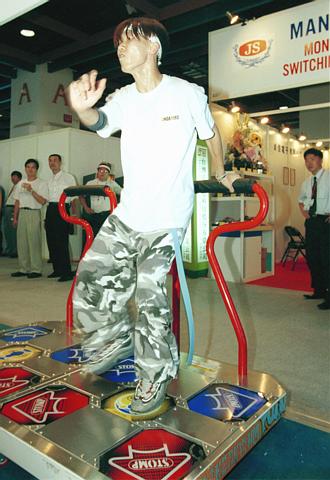Government officials and industry bosses mixed in with a hall full of bikini girls and video slot machines yesterday morning, expressing enthusiastic support for video gaming in Taiwan. The event was the opening ceremony of the GTI Expo 2000, local industry's annual trade fair at the Taipei World Trade Center.
"If children in other countries can enjoy these kinds of electronic games, why should children in Taiwan be subject to these restrictions?" asked legislator Zhuo Rung-tai (
With the recent passage of a national gaming law, however, gaming in Taipei may see a resurgence.

PHOTO: CHANG YING-YING, TAIPEI TIMES
"In the legislature, we are looking for a way -- taking into account the need for guidance and responsibility -- to allow games in Taiwan," said Zhuo.
Similar shows of support also came from former legislator Chuan Chou (周荃) and Ministry of Economic Affairs Commercial Section Chief Liu Kun-tang (劉坤堂).
Still, most major gaming players were skeptical. "The law in itself is not bad. The problem is that it is being implemented by two separate units, the Ministry of Economic Affairs and the police," commented Lin Hung-tao (
Unfortunately, Taiwan law is not the only problem for video games. The global industry also happens to be in the midst of a major downturn as home console games, such as Sony Playstation, and PC games are gaining popularity, and gaming parlors are forced to search out unique draws. What's even worse, there's not much innovation going on.
Most of Sega's new offerings at the fair played on old themes. Slashout is a variation on 3D fighting games that adds swords and lets players fight the bad guys in tandem. There is also a new photo sticker booth that photographs the entire body as well as a crane-grabber type game that has been adapted to let players scoop out live goldfish.
The newest trend, then, is still simulation games, which has been around since Konami introduced Dance Dance Revolution (DDR) in 1997.
DDR is an electronically coached dance step game which requires players to tap their feet on illuminated squares to score points. Subsequent variations have let kids pound away on virtual drums, strum virtual guitars, spin virtual turntables, jockey virtual horses, and paddle virtual rafts. Though these simulators have not found widespread acceptance in the West, they account for roughly 20 percent of sales to gaming parlors in Asia.
This year, Konami has introduced a fourth generation DDR, which 14-year-old Chen Bo-wei, who earned a spot promoting DDR through a Kaohsiung DDR competition, says is "pretty much the same, it just has over a hundred songs."
Due to all of setbacks, only two Taiwan video game makers are trying to boost business with new products.
ISG has come out with its own dancing games and music simulators, which use Chinese songs to target Chinese gamers and also compete with the likes of Konami by selling them underneath the ?1 million barrier.
Viva VR, meanwhile, is a newly formed company, which draws on the experience former military simulator designers and film directors to create virtual theaters for theme parks.
The rest of the industry is sticking to the old standards, namely low priced gambling games for Southeast Asia, South America, and Europe.
Last year, Taiwan's game makers exported NT$3 billion worth of electronic games, 80 percent of which were "adult games," like virtual slot machines, poker, and horse racing, said Huang Han-shu (黃漢書), vice-chairman of TAMA (Taiwan Amusement Machine Association). The exhibition runs through Sunday and is open to the public.

Intel Corp chief executive officer Lip-Bu Tan (陳立武) is expected to meet with Taiwanese suppliers next month in conjunction with the opening of the Computex Taipei trade show, supply chain sources said on Monday. The visit, the first for Tan to Taiwan since assuming his new post last month, would be aimed at enhancing Intel’s ties with suppliers in Taiwan as he attempts to help turn around the struggling US chipmaker, the sources said. Tan is to hold a banquet to celebrate Intel’s 40-year presence in Taiwan before Computex opens on May 20 and invite dozens of Taiwanese suppliers to exchange views

Application-specific integrated circuit designer Faraday Technology Corp (智原) yesterday said that although revenue this quarter would decline 30 percent from last quarter, it retained its full-year forecast of revenue growth of 100 percent. The company attributed the quarterly drop to a slowdown in customers’ production of chips using Faraday’s advanced packaging technology. The company is still confident about its revenue growth this year, given its strong “design-win” — or the projects it won to help customers design their chips, Faraday president Steve Wang (王國雍) told an online earnings conference. “The design-win this year is better than we expected. We believe we will win

Quanta Computer Inc (廣達) chairman Barry Lam (林百里) is expected to share his views about the artificial intelligence (AI) industry’s prospects during his speech at the company’s 37th anniversary ceremony, as AI servers have become a new growth engine for the equipment manufacturing service provider. Lam’s speech is much anticipated, as Quanta has risen as one of the world’s major AI server suppliers. The company reported a 30 percent year-on-year growth in consolidated revenue to NT$1.41 trillion (US$43.35 billion) last year, thanks to fast-growing demand for servers, especially those with AI capabilities. The company told investors in November last year that

Power supply and electronic components maker Delta Electronics Inc (台達電) yesterday said it plans to ship its new 1 megawatt charging systems for electric trucks and buses in the first half of next year at the earliest. The new charging piles, which deliver up to 1 megawatt of charging power, are designed for heavy-duty electric vehicles, and support a maximum current of 1,500 amperes and output of 1,250 volts, Delta said in a news release. “If everything goes smoothly, we could begin shipping those new charging systems as early as in the first half of next year,” a company official said. The new